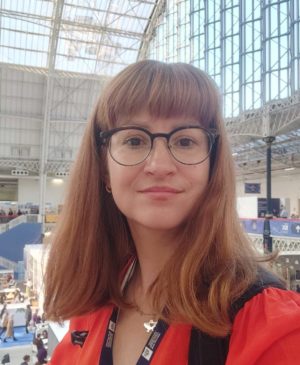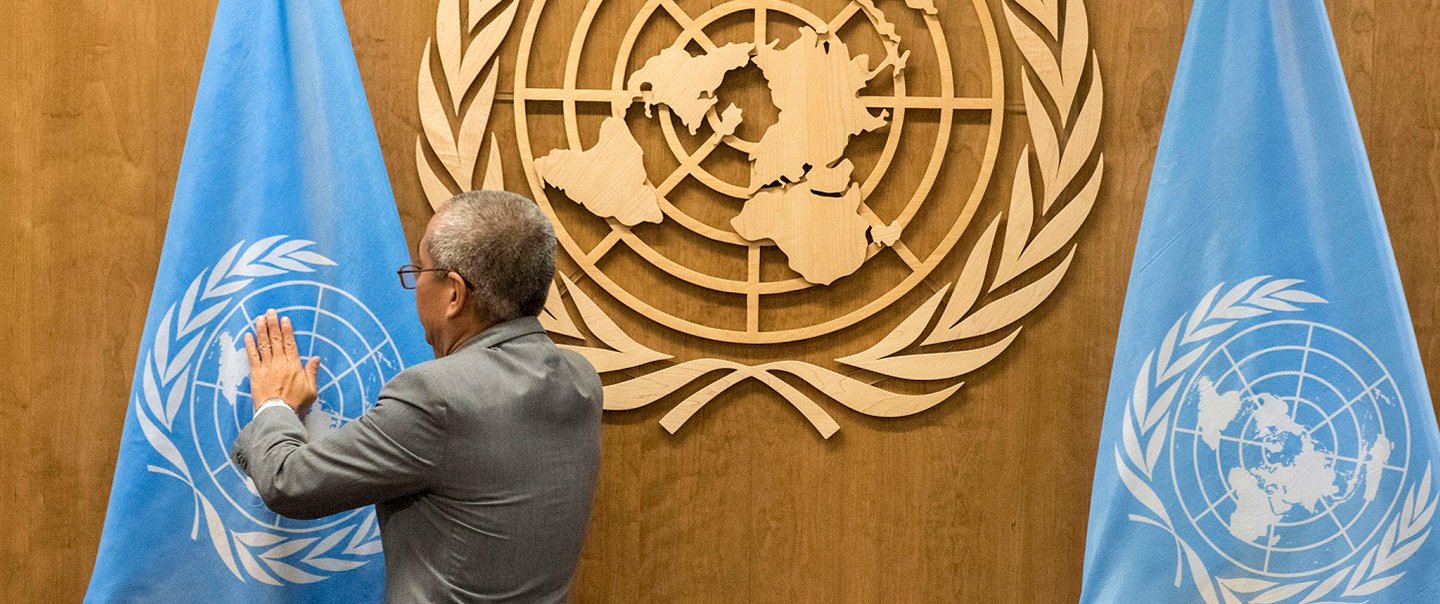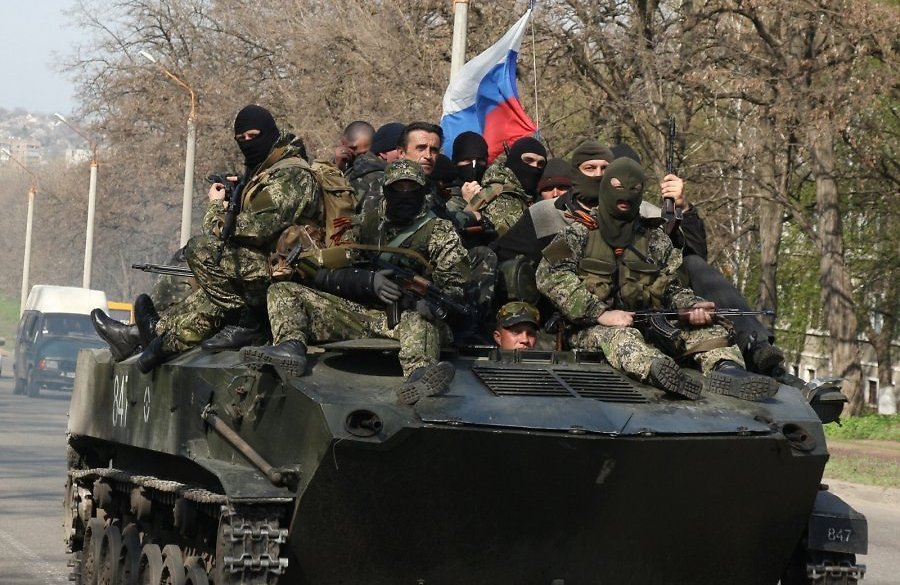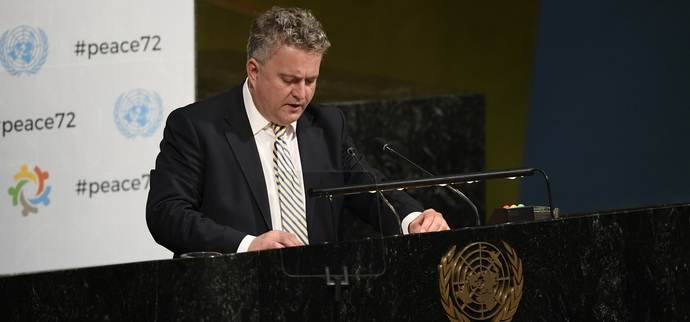
Ahead of the UN Summit for the Future, an international, intergovernmental group is pushing to "break the taboo" on reforming the UN Charter. We talked to its Ukrainian participant, Olga Tokariuk, to find out how who is behind the drive to transform the UN -- and whether it would lead to real change.
How did the idea to reform the UN emerge?
An organization called the Global Governance Forum reached out to me through its CEO, Augusto Lopez-Claros, a former official at various international organizations, mostly financial institutions like the IMF and World Bank.
He chairs the organization Global Governance Forum. He reached out to me and invited me to be part of a working group that would work on proposing a UN Charter of Reform.
The idea from Augusto and others he gathered was to propose a new system of global governance because the current system is clearly not functioning well. Russia's full-scale invasion of Ukraine is just another confirmation of the failure of the current global governance system, of the United Nations, to ensure global peace and stability, which is the main reason the UN was formed.
In the UN Charter, if you open Article 1, or even the preamble, it says the UN was formed to ensure international peace and stability. This is not happening. On the contrary, we see more conflict, more wars of aggression launched by nuclear powers.
We see complete abuse of power by the P5, the permanent five members of the UN Security Council. And we see no system of accountability for further (or previous) violations, because of course there are people who say, well, it’s not just Russia. But if it’s not just Russia abusing international law and committing human rights violations and abusing the UN Charter, then there needs to be a system of accountability and implementation in place.
With this idea in mind, a group of current and former diplomats, some who have served in the UN before, some who have served their own countries as foreign ministers or officials, as well as academic representatives from various universities, think tanks, NGOs active in politics internationally, so far there have been two in-person meetings of this working group, both in Madrid, one in January this year and one in June.
As a result of these two meetings, a declaration was prepared to gather widespread support for the idea of UN Charter reform. This declaration is now published on the Global Governance Forum website. Anyone can sign it, there are no particular requirements. So anyone who believes the UN needs reform, that the system of global governance needs reform, can sign this declaration calling for opening up the discussion and debate, which we don't see happening much in that direction.
So at this stage, anyone reading this can join and contribute - you can sign the declaration calling for UN reform. Then this working group, which I believe will expand in the future to include more country representatives, will continue working on the draft proposal. It is still a work in progress.
Just a few words on the representativeness of the group - it includes former and current officials, think tanks, academics, NGOs/civil society. In terms of countries, I think it’s quite representative. I am the only Ukrainian. There are no Russians, as there should not be, because the aggressor cannot initiate a reform hindering its own rights.
There are officials from countries like Ecuador, Sierra Leone. There are non-governmental people from China, opposed to the Beijing regime, from Bulgaria, Germany, US, UK, India, people from the Global South, Europe, other Western countries, Africa, Australia/New Zealand.
Let's talk about what exactly you want to reform. Did the post-World War II UN system actually achieve any of its goals? Because we've heard it hasn't - it was unable to prevent the war in Ukraine - but has it achieved anything, the existing system?
Well, I'm not an expert on the UN's work or history - it's not my area of specialization. I'm here as a representative of Ukrainian civil society, a Ukrainian voice in this group, not a UN expert. I can't provide a fully comprehensive answer on that, but I think there can be debate on it.
Some argue that between the end of WWII and the 1990s, there was peace in Europe at least, on the continent, so maybe that's an achievement of the UN. Others would be more skeptical, because obviously the UN should care about more than just the West.
I think the need for reform is felt by many in different countries, because it will focus not only on political reform of the Security Council, but also on new global challenges that have arisen since the UN Charter was adopted after WWII, like climate change, global food insecurity, the rise of artificial intelligence and its use in warfare.
Hopefully what I see is that the sense of this group, the competent people in various fields like climate change, military technology, AI, they would contribute their input and vision into mentioning these 21st-century challenges in a new UN Charter. The working title of the group is the Second Charter, because we already have the First Charter from 1945, and now we are working on a Second.
What exactly is not working now, and how should it be changed?
Clearly, what is not working is the UN has failed to achieve global peace and stability, failed to prevent abuse of power by the P5, the Security Council itself needs reform because it doesn't represent the world of today, and new challenges need to be addressed that weren't there 60-70 years ago but are very relevant now.
The veto system should be either removed or reformed so it's not limited to just five countries, or the veto share is not equal. There are proposals to base it on other criteria like population or GDP, whatever. But definitely removing the system where only five permanent Security Council members have veto power to block any decision or hold other countries hostage to aggressive policies. That needs reform and I think that would have the most direct impact on Ukraine and Russia.
I advocate Russia should be excluded from any future security councils, reformed or not, because it has committed enough crimes to be permanently excluded and deprived of its veto power for abusing the system so egregiously. I have some supporters and opponents, but it’s still a discussion in progress.
Trending Now
How Russia could be removed from the UN Security Council
Do you know if you have any supporters among active UN members that support your proposals?
I definitely hope so, and on 19 September there will be a launching event at the UN General Assembly building. I think that already speaks volumes about the prominence of this initiative, the ability to reach out to current UN officials.
I forgot to mention we also have a Nobel Peace Prize winner, Jody Williams, as a member. She has a wide network among Nobel laureates, so with people like her I think it shows the prominence of this group and the support we have from 20 former Nobel winners for this initiative.
People who are former UN officials, I'm sure they are talking to colleagues still there, raising awareness and getting a sense of the openness, and they are quite optimistic from their feedback that the UN Secretary General is warming to the idea of charter reform.
Next year there is a UN Summit for the Future, so the hope is to bring this idea to a higher level before that, get it on the agenda as a proposal item.
How difficult do you think it will be to displace China and Russia from permanent Security Council membership?
Well, of course there is inertia and reluctance to reform, especially by countries benefitting from the current faulty system. There will be a lot of lobbying and attempts to discredit initiatives like this one. But it won't stop us from doing what we're doing, talking about things that would generate wide public support. I'm sure opinion polls would show many people, a majority, agree the UN needs reform and is dysfunctional in its current state, not fit for 21st century challenges.
Do you believe after this reform the UN will actually become an effective force in preventing conflicts?
That's a very good question. In our debates, I think about whether all our nice reform proposals, how do we ensure a mechanism for implementation? I think that's why the current UN is dysfunctional - no efficient implementation mechanism for the nice words in the Charter.
I'm stressing we need implementation mechanisms, strengthening the ICC's capacity and jurisdiction, making its decisions binding. Maybe new mechanisms at the UN where General Assembly resolutions become legally binding, because now we have resolutions like on Russian aggression passed by an overwhelming majority, but no binding implementation mechanism. Just nice words without teeth.
I'm arguing new mechanisms must be developed to ensure not just theoretical frameworks but legally binding implementation and accountability for Charter violators, unlike now.
- Remove or reform the veto power of the 5 permanent members;
- Expand membership to better reflect current geopolitics and demographics
- Add longer-term rotating seats (8-16 years) to allow greater substantive contribution;
- Replace veto with weighted voting system to encourage coalition building;
- Increase overall UNSC membership to improve global representation;
- Consider qualified majority voting on issues instead of unanimity;
- Increase transparency when veto is used (e.g. automatic General Assembly review);
- Draw on models from other international organizations (EU Council, Bretton Woods) that balance power and representation;
- Focus reforms on improving legitimacy, effectiveness, and overcoming paralysis.
Related:





